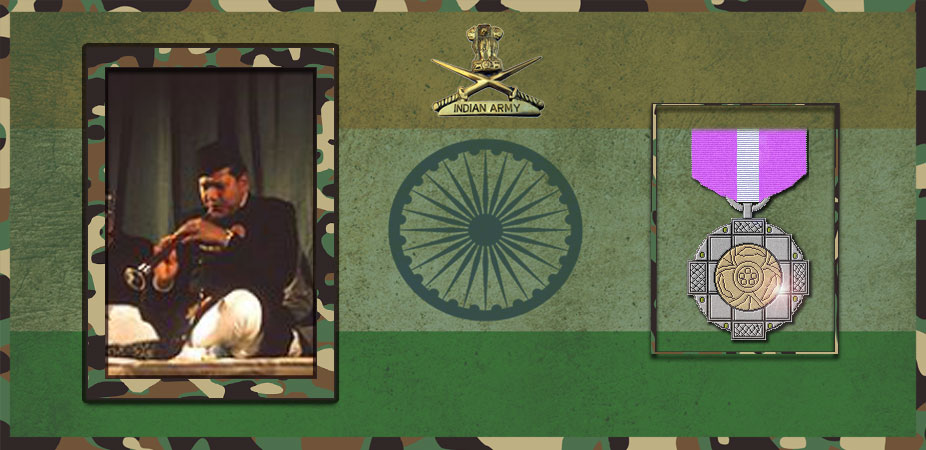Let's salute to our Indian Army together, We are proud to be Indian.
Let's salute to our Indian Army together, We are proud to be Indian.

Ustad Bismillah Khan (21 March 1916 – 21 August 2006) (born as Amiruddin Khan), often referred to by the honorific title Ustad, was an Indian musician credited with popularizing the shehnai, a subcontinental wind instrument of the oboe class. While the shehnai had long held importance as a folk instrument played primarily during traditional ceremonies, Khan is credited with elevating its status and bringing it to the concert stage.
He was awarded India’s highest civilian honour, the Bharat Ratna, in 2001, becoming the third classical musician after M. S. Subbulakshmi and Ravi Shankar to be accorded this distinction.
Khan was born on 21 March 1916 in a family of traditional Shia Muslim musicians in Bhirung Raut Ki Gali, Dumraon, in what is now the eastern Indian state of Bihar, as the second son of Paigambar Baksh Khan and Mitthan. While named Amiruddin at birth his grandfather Rasool Baksh Khan exclaimed “Bismillah” and thereafter he came to be known by this name. His father was a court musician employed in the Dumrao palace by the Raja of Bhojpur. His great grandfather Ustad Salar Hussain Khan and grandfather Rasool Baksh Khan were also musicians in the Dumrao palace.
His ancestors were court musicians and used to play in Naqqar khana in the princely states of Bhojpur, now in Bihar. His father was a shehnai player in the court of Maharaja Keshav Prasad Singh of Dumraon Estate, Bihar.
At the age of six, he moved to Varanasi. He received his training under his uncle, the late Ali Baksh ‘Vilayatu’, a shehnai player attached to Varanasi’s Vishwanath Temple.
The Government of Bihar has proposed setting up of a museum, a town hall-cum-library and installation of a life-size statue at his birthplace in Dumraon.
Religious beliefs
Khan was a pious Shi’ite Muslim, and was also a symbol of communal harmony. He also performed for spiritual master Prem Rawat.
Khan was perhaps single-handedly responsible for making the shehnai a famous classical instrument. He brought the shehnai to the center stage of Indian music with his concert in the Calcutta All India Music Conference in 1937. He was credited with having the almost monopoly over the instrument as he and the shehnai are almost synonyms.
Khan is one of the finest musicians in Indian classical music. He played the shehnai to audiences across the world. He was known to be so devoted to his art form that he referred to shehnai as his begum (wife in Urdu) after his wife died. On his death, as an honour, his shehnai was buried with him. He was known for his vision of spreading peace and love through music.
Khan had the rare honor of performing at Delhi’s Red Fort on the eve of India’s Independence in 1947. He also performed raga Kafi from the Red Fort on the eve of India’s first Republic Day ceremony, on 26 January 1950. His recital had become a cultural part of India’s Independence Day celebrations, telecast on Doordarshan every year on 15 August. After the prime minister’s speech from Lal Qila (the Red Fort) in Old Delhi, Doordarshan would broadcast a live performance by the shehnai maestro. This tradition dated from the days of Jawaharlal Nehru.
Khan had a brief association with movies. He played the shehnai for super star Dr.Rajkumar’s role of Appanna in the Kannada movie Sanaadi Appanna which became a blockbuster. He acted in Jalsaghar, a movie by Satyajit Ray and provided sound of shehnai in Goonj Uthi Shehnai (1959). Noted director Goutam Ghose directed Sange Meel Se Mulaqat, a documentary about the life of Khan.In the 1967 film The Graduate, there is a poster advertising “Bismillah Khan and the seven musicians” on a busy street of Berkeley, California.
Khan seldom accepted students. He thought that if he would be able to share his knowledge it wouldn’t be useful as it would only give his students a little knowledge. Some of his followers include S. Ballesh, as well as Khan’s own sons, Nazim Hussain and Nayyar Hussain.
On 17 August 2006, Bismillah Khan was taken ill and admitted to the Heritage Hospital, Varanasi for treatment. He died after four days on 21 August 2006 because of a cardiac arrest. He is survived by five daughters, three sons and a large number of grandchildren and great-grandchildren, and his adopted daughter Soma Ghosh (a Hindustani Shastriya Sangeet exponent).
The Government of India declared a day of national mourning on his death. His body along with a Shehnai was buried at Fatemain burial ground of old Varanasi under a neem tree with 21-gun salute from Indian Army Sangeet Natak Akademi, New Delhi, instituted the Ustad Bismillah Khan Yuva Puraskar in 2007, in his honour. It is given to young artists in the field of music, theatre and dance.
Awards
Bismillah Khan had honorary doctorates from
Others include